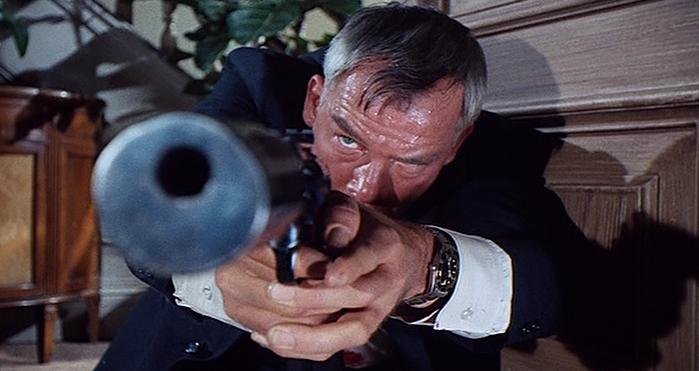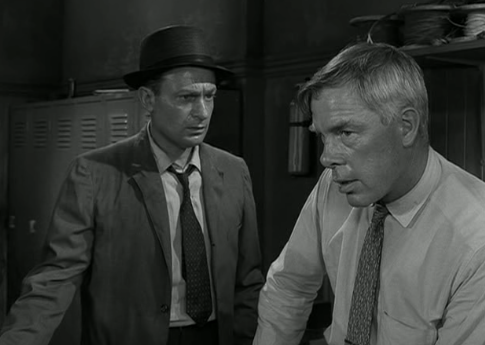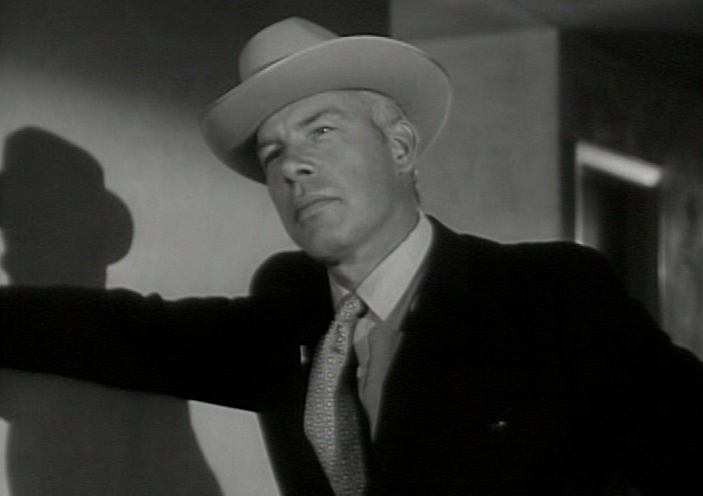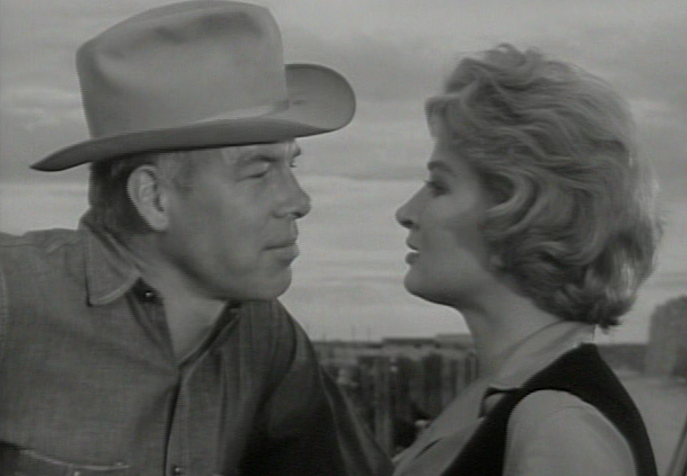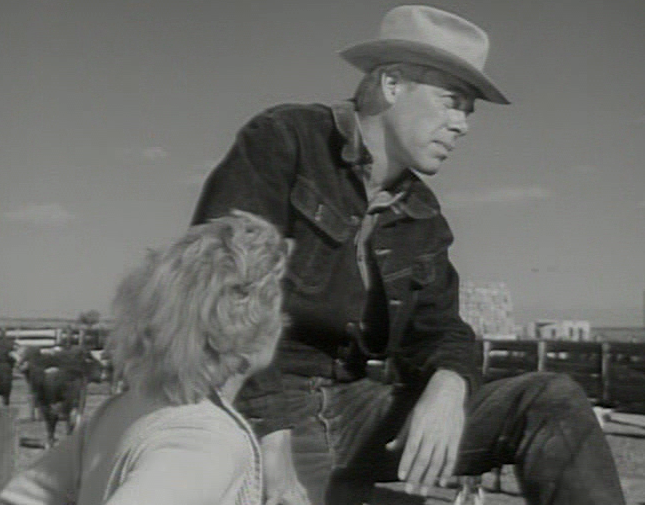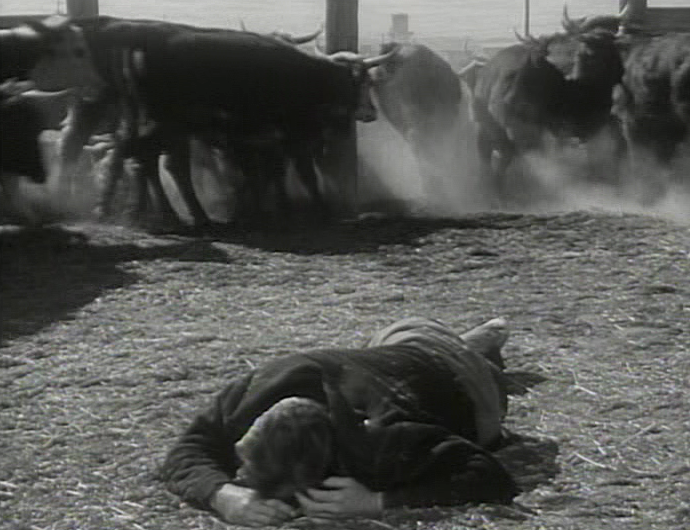Lee Marvin wasn't created with Cat Ballou: everything he appeared in up to that point played a part in his whiskey-soaked evolution into the bitter, hard badass we all know and love.
John Cribbs got to thinking about how amazing it would be if there were a channel that you could flip to any time of the day and see Marvin in some long-forgotten TV serial. Since nobody's had the inspiration to create such a glorious shrine, he decided to program his own personal Lee Marvin Network by unearthing some examples from the first leg of Lee's filmography and make them part of a series called "LeeTV."
{ LeeTV index }
~ by john cribbs ~
Route 66 is a cool concept for a TV show. Not the plot of the show itself, which is little more than a Fugitive-in-a-convertible type anthology premise where the two heroes stumble upon a new set of people with a new set of problems each week, without anybody even chasing them or the curse of the Incredible Hulk. But the idea of a TV show literally on the road, the production moving from one town to another across America, is pretty nifty. And that's literally
what they did: they'd shoot at Niagara Falls one week, the Glen Canyon Dam the next. It was created by Stirling Silliphant (if you don't know who he is - and don't assume from his name that he's some kind of Seussian fish-elephant creature of some kind - you should really check out Mark Harris' vastly entertaining Pictures at a Revolution), who basically traveled around finding these cool locations across America and writing scripts around them - an admirably Gonzo method. The series ran for four
seasons in the late 60's, when that Keroauc-ian notion of setting out on the open road was at its most romantic. It's actually a nice break to see a series about two dudes out on the open road being produced at the same time every Hollywood road movie was an existential parable about intangible destinations and personal destruction. Silliphant, who wrote the most of the episodes ("bulk of the series"), penned this episode and there's lots of enjoyably overwritten dialogue that I'll discuss in a second.
Also, there's Lee Marvin.
The heroes are Tod and Buz, both pretentiously dropping the extra letter from their names, a Batman and Robin-type team in a Corvette who pull off the highway in El Paso looking to "let the tumbleweed out of our shoes." They get a jobs as forklift operators (they've just got to be driving something at all times, don't they?) and through their new employer meet a troubled young widow named Laura Church, who's just been released from
a short stint in prison for stealing money from the payroll. I guess they let her come back to work as some sort of "second chance" program or probationary period, but nobody there trusts her and she's miserable that everybody is constantly keeping an eye on her, especially since she didn't do it. This is just further torture for poor Laura. She's an alcoholic on the verge of total relapse: something dark from her past is haunting her, and a manipulative ranch head who calls her "Sheba" holds
a sadistic sway over everything she does. Thankfully along come our weary travelers, who instantly make her feel better about herself and more comfortable about her situation, right?
Wrong! These two guys come off as major scumbags! The first conversation Tod has with her, he pretty much flat-out tells her he doesn't believe she's innocent of the crime. Then later the two of them cozy up to her in their Corvette as she's walking down the street. Buz has a sweater tied around his shoulders like some preppy tennis player/date rapist, and they offer her a ride by telling her she's the prettiest girl they've seen in Texas,
implying that she's invited to come back to the hotel with them! Not surprisingly, she's not at all charmed by this weirdly gross behavior. These are supposed to be the good guys? At one point they're visiting a ranch, being shown a cow-soundin' truck horn that causes the cattle to rush towards the noise and our gallant hero says "Somebody should invent a horn to stampede women like that." You sexist bastard! I mean, does this turn out to be some kind of undercover act? Or is all this in service of
something they're going to end up learning about themselves and their own attitudes towards women? Not really: if anything, the message of the episode more or less ends up being that women can't take care of themselves and need some guys there to save them. Seriously, Tod and Buz talk about Laura like she's some kind of lab animal they have to trick into letting them help her. At one point they even discuss employing Freudian tactics to use on her psychologically and get her to open up about her problems. When
do these dudes have time to study Freud while they're cruising around the country?
These two pretentious bozos get their asses handed to them by the man responsible for framing Laura for embezzlement and, it's later revealed, orchestrating the "accidental" death of her husband. That man is Woody Biggs, played of course by Lee Marvin. Biggs has such a tenacious grip on Laura that he's already waiting for her outside the jailhouse when she gets out, a flesh and blood reminder that he put her there and could
have her put back in, or worse. In fact it was his pulling strings that got her paroled: he's powerful enough to put her in AND get her out, which makes him even more ubiquitous a menace: he knows how to work the system. His wooing methods are psychotic, like leaving brand new fur coats as gifts around her apartment while she's out. When he shows up at her place, letting himself in with a key he got from her dead husband (did he take it right off the corpse?), he directs her to a whiskey bottle he's left concealed
behind a picture. She yells at him to get out and throws the fur coats at him, but - as he points out - she doesn't throw the bottle. This guy's got her number, and he plans to suck her dry.
Clearly Biggs is the worst kind of manipulative monster, but Marvin makes him so devilishly cocksure it's hard not to like him, absolutely moreso than the two meddling leads (he should have taken their car after kicking their asses.) He's the kind of smarmy, scheming yet fake polite/charming villain who keeps his head down and traces the inside brim of his hat while he's talking to people in a condescending "well gosh" manner.
He keeps up that demeanor right to the second before he belts Tod to the ground. Besides being an efficient fighter, he's an effortlessly smooth pimp who treats the ladies like the cattle at his ranch, getting them closed into corners and herding them to yet another dead end - right where he wants them. It's interesting that the story includes a submissive female bookkeeper who works at the ranch and lets Biggs get away with whatever he wants to do, even though she's clearly intelligent and compassionate
enough to warn others away. Biggs has a lot of choice lines that practically ooze with impropriety ("There's only one way to forget a man, Sheba, and that's with another man") that Marvin delivers with that seductively intimidating lull he usually brings to his characters whose intentions are the exact opposite of noble. Also it's the period (early 60's) where Marvin's gray hair was just starting to come in on the sides, a look that makes him look like he's slowing aging with corruption!
Because of Marvin's relaxed acting style, it's easy to forget how talented he is and how different his various bad guys really are. Biggs may be street smart and a fast talker like Bill Masters in Seven Men from Now, but he lacks the code of honor that made Masters stop to appreciate Walter Reed's final un-cowardly act when he walks determinedly towards the sheriff's station. Biggs is much more of a pervert: Marvin's sneering
looks and excited gestures show that he probably doesn't want to make a wife of Laura, he just gets off on tormenting her. If she ever fully gave herself over to him, he'd probably get bored and toss her to the curb. In that sense he's got more in common with the playful bullying of Liberty Valance, so willing to pick on the weakling who can't shoot (i.e. a troubled, lonely woman) or, like Hector David in Bad Day at Black Rock, the man with only one arm. Yet Biggs is tougher than those guys, willing
to scrap with the Corvette-driving John Waynes of this story, and has at his disposal lots of powerful friends and connections that grant him even more sway in his tiny part of the world. With that in mind, Woody Biggs is possibly the most dangerous bad guy I've ever seen Marvin play: sadistic, relentless, and able to pull the right strings to come out on top, even cover up a clear case of murder. Tod and Buz are no match for this evil asshole,
which is what makes the rather clean ending of the episode such a letdown.
Basically, the Duke Boys Tod and Buz come to the rather obvious deduction that Biggs used the car horn that sounds like a cow to work the herd into a stampede that ran over Laura's unsuspecting husband. Rather than take their evidence to the local authorities (Biggs probably has them in his pocket anyway), they opt for the more direct approach of confronting the killer on his own property, which also happens to
be the scene of the crime. Shockingly, Biggs does not voluntarily confirm their accusations - he maintains a cool gaze across the head of cattle and dismisses Laura with many harsh insults as to her character while sitting atop the fence wearing an air of superiority. His nonchalance drives Tod crazy, so he calls him out by pointing to the other side of the fence and challenging "Maybe I'll put you in there, what do you say?" Biggs' comeback is priceless: "Well, I say you put on
a few pounds before you try anything." Indeed, our Tod isn't Todd Smith, aka Handsome Johnny (Chaotic Wrestling conferrer of the Sin City Plunge), so he has to rely on wussy tactics to get Biggs into the "ring"...he sucker-punches him from behind! Ref, are you blind?? Tod leaps in after his victim and
continues to wail on the defenseless Biggs, who it's been revealed had just recently been gored by a bull and has stitches in his side. He pins Biggs to the dirt and shouts for his partner to blow the car horn (he refuses and Laura ultimately ends up doing it; good thing you can rely on your cross-country compadre huh Tod?) Under threat of being stomped to jelly by the rampaging herd, Biggs responds to Tod's allegations with a single word - "Yes!" - and lies remains there, defeated in the dust, as the
others steer the cows in another direction. (It's funny how the first two Lee TV entries I picked both ended up having Marvin utterly humiliated on his back in his final shot of the show.) Anyway, I'm not sure this is all gonna hold up in court guys...what jury is going to accept the forced confession of a man held down in front of an uncontrolled stampede? All he said was 'yes,' who knows which of Tod's demanding questions he was even referring to? And who heard him say it over the sound of the raging bovine?
Not Buz or Laura, they were busy driving the truck around the other side to divert the herd. More likely, these two idiots (who also punch out one of Biggs' cowhands) are going to get charged with trespassing and assault. Better rev the Corvette up, Buz!
Sometimes Silliphant's stylish dialogue is fun to listen to, like when Tod and Buz hit a swanky restaurant where the bartender, claiming the site is close to bomb testing from the 40's, makes radiation-themed mixes. (I wasn't aware of nuclear tests carried out in El Paso, but I guess this is the kind of thing Silliphant did with the show: find out about the area where they were filming and incorporate its history into the story.) He boasts about
his "vermooth fallout...the driest martinis in the world - plus chain reaction!" When he serves them their drinks he says "This'll make ya glow." Absolutely overwritten, but entertaining. It's more of a chore to sit through the moments where he sits the viewer down and hand-feeds him the themes of the story. I mean, I got the reference to King David and Bathsheba, the famous story of the husband David arranged to die because he wanted her to himself, but Silliphant has Laura spell
it out by explaining to Tod/us why Biggs gave her such an odd nickname. Boy, I'll bet investigators would sure appreciate it if criminals gave historical or literary nicknames to the people they'd wronged. "Jeez McNeil, we've really hit a dead end on this horrible case of the decapitated holy man. Hopefully we'll catch a break when we interview this rich guy with connections to the mafia, the old lady he's friends with, and her daughter
the stripper who turns him to jelly, the one he calls 'Salome.' What a weird fuckin' nickname..."
I think Silliphant's failing, with this episode at least, is that he gets the point across without actually making it. Like his screenplay for In the Heat of the Night, where you hear "Sidney Poitier as a cop...in the South!" and instantly know what we're going to be dealing with here although the script does little to expound upon the shopworn tropes of that basic premise, "Sheba" has all the groundwork pretty much laid out from
the opening scene outside the prison. A woman who can't defend herself being preyed upon by a man who walks around with his dick hanging out whose very name is suggestive of his posturing libido. Theoretically, it's a solid working idea and even a somewhat radical one for its time (I guess) but since it's squeezed into this episodic format centered around two gallant knights in a convertible there's no way for it not to come off as a standard tale of a damsel in distress. Although she plays a small part
in deflating Woody's woody (she blows a horn while a man straddles him from behind...I don't know what to make of that), she doesn't turn a corner on her own and is so perpetually victimized the only thing missing is the scene where Biggs ties her to a railroad track. Especially since the only other female character is the bookkeeper, whose response to Biggs' invasion of her personal space is much more tolerant, the idea is less "women should stand up for themselves" and more "women go one
of two ways: they put up with jerks or they let them walk all over them." Sam may have solved a lot of females' problems on "Quantum Leap," it was almost always within a historical context and never felt like the show was trying to motivate women everywhere to stick up for themselves, dammit! While I guess that's the point, I still have to ask...what's the point? It's summed up pretty nicely in one of the more boneheaded lines from the episode: "Experience
is just what happens to a person." Well yes that's true...but so what? It's an unsuccessful attempt to rephrase an obvious statement to make it sound smart, when you've actually made it sound stupid. Like the story of a woman escaping a dick-swinging male...by being saved by two other dick-swinging males.
Am I letting Biggs, a slimy bastard, off the hook to some extent just because he's Lee Marvin? I think I actually respect him more than the heroes because he doesn't hide his douchey side - he's a liberated misoynist. But I think that kind of thing would be hard for anyone other than Lee Marvin to pull off.
~ 2011 ~

